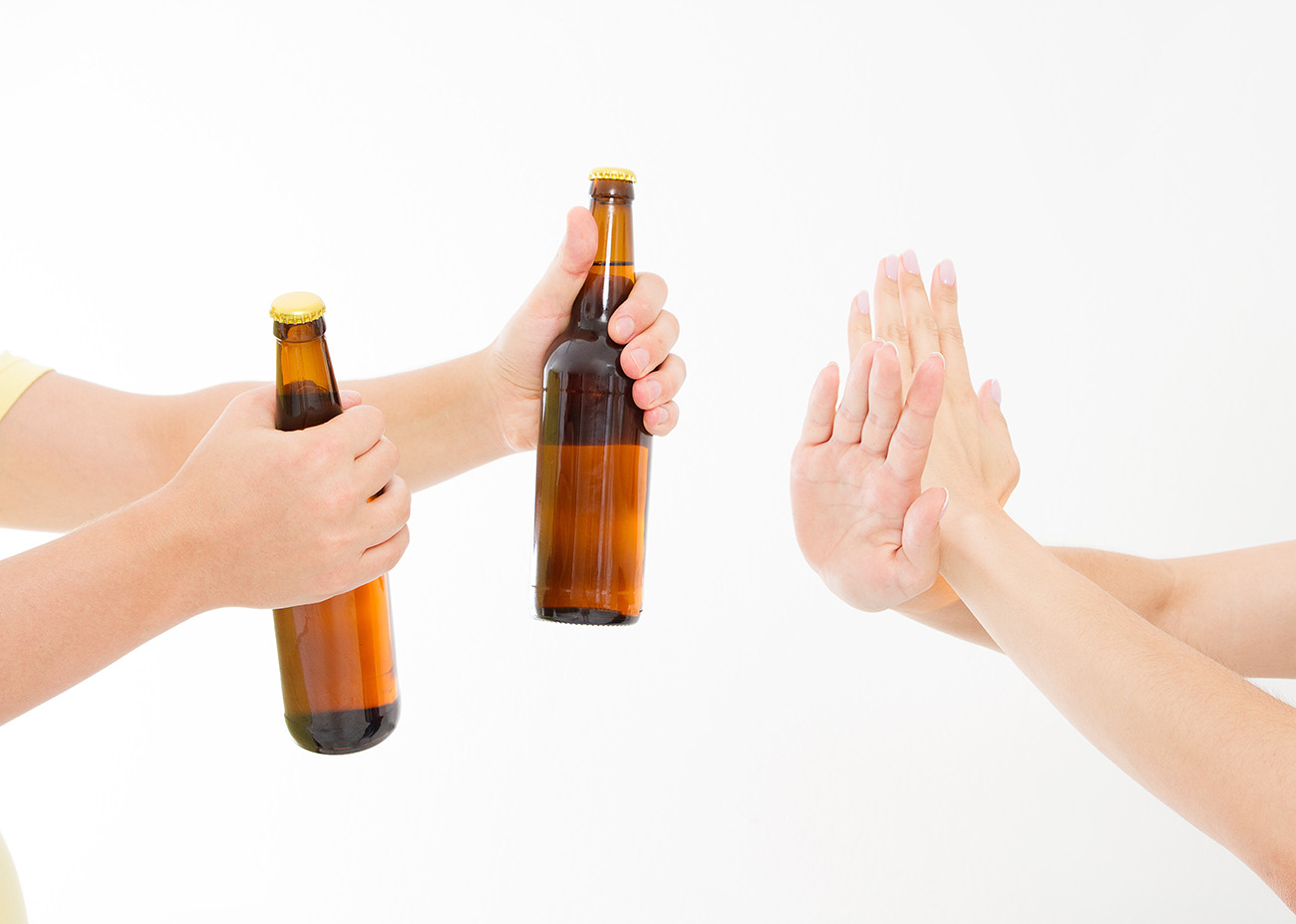What Are The Benefits of Quitting Alcohol for a Month?

female hand reject a bottle of beer isolated on white background.anti alcohol concept. Copy space
With 2022 just beginning, many people are starting to get into their New Year’s resolutions. Quitting or reducing alcohol consumption is, by far, one of the most popular New Year’s goals, and a worthy one at that. To make things easier, many people who drink regularly begin with a resolution to quit for just one month.
Fortunately, there is a wide range of physical and mental health benefits to this very modest goal. Below are some of the things a regular moderate drinker (consuming approximately 1-2 standard units of alcohol a day) could expect in their first month of abstinence. If you experience serious withdrawal symptoms after ceasing alcohol use, please see a medical professional immediately.1,2,3,4,5,6
The First Day
If you drink regularly, you may experience some withdrawal symptoms on the first day. In individuals with severe alcohol use disorder (AUD), these symptoms will be felt within a few hours of ceasing alcohol intake. Even mild withdrawal symptoms can be uncomfortable for some people. These can include irritability, severe headaches, excessive sweating, and anxiety.
People with moderate AUD may also experience severe pain, fatigue, depression, delirium tremens (tremors and shakes), seizures, suicidal thoughts, and hallucinations. If you experience any of these symptoms, it’s critical to see a doctor immediately.
The First Week
Most people who experience mild withdrawal symptoms should see them stop within a week. Blood pressure should start to normalize and anxiety symptoms associated with withdrawals should cease.
By the end of the first week, sleep quality, particularly the depth and onset of sleep, should be improved in most regular drinkers who quit alcohol. Their body’s hydration levels should also be slightly improved and decision-making should become less-impaired. Assuming you drank 1-2 standard units of alcohol a day, six days a week, you will also have saved anywhere from 800-2,000 calories.
However, if you have AUD, you will likely still experience strong cravings at this point, as it may take months or years for the brain connections created by alcohol consumption to be completely bypassed.
Second Week
Even moderate amounts of alcohol can damage your body over time. Even though most alcoholic drinks contain a high water content, alcohol can cause a net loss of moisture over time due to its diuretic properties. In other words, unless you make sure to drink plenty of water, you’ll tend to urinate more than you take in. This results in your bodily tissues becoming damaged over time, with your skin being the most obviously affected.
Thankfully, the damage is usually visibly lessened by the second week, as your body begins to take in proper amounts of hydration. Ceasing drinking also gives your body a chance to heal, something that it may not be able to do if forced to constantly adjust for daily alcohol consumption.
Third Week
The healing continues through the third week, with organ function continuing to improve. Your liver, kidneys, and digestive tract will have had a much-needed break from all the alcohol and they should be functioning much closer to normal. Vision should noticeably improve as your eye muscles regain their complete range. Your circulatory system should also see some improvements, which, may also reduce the risk of strokes and heart attacks while helping with sexual function.
People with AUD may experience less frequent cravings and may be emotionally stable enough to receive psychotherapy to continue their abstinence.
Fourth Week
Close to the end of the first month of no alcohol, your skin’s appearance should be significantly improved from when you started, and many of the premature aging caused by regular alcohol consumption should be mostly halted. Your liver will likely have mostly healed by this point, allowing it to better help your immune system, prevent low energy levels, and process nutrients from the food you eat. This means you will get sick less often, feel better, and heal faster.
Additionally, you will have saved up to 8,000 calories in the past month, which may mean that you have also experienced some weight loss. You will also have saved a non-trivial amount of money that would have otherwise been spent on alcohol. Your baseline mood, memory, productivity, and mental health should have also improved.
If you have AUD, however, chances are you will still feel a few cravings. If you want to continue your gains, consider seeing a qualified mental health expert to help you further improve on your recovery gains.
Find Help Quitting Alcohol in Dallas, TX
Quitting alcohol even for just a month brings a whole host of health benefits for regular drinkers as well as for people who have developed AUD. If you find that you are unable to comfortably quit alcohol, it could be a sign of an underlying alcohol use disorder. If this is the case, please get in touch with a qualified mental health professional immediately. You can call Dallas Drug Treatment Centers at +1(214) 935-2287 to find alcohol treatment and rehabilitation options in the Dallas-Fort Worth area.
Resources:
- Becker, H. C. (2008). Alcohol dependence, withdrawal, and relapse. Alcohol Research & Health.
- National Institute on Alcohol Abuse and Alcoholism. (n.d.). Alcohol’s effects on the body.
- National Institute on Alcohol Abuse and Alcoholism. (n.d.). What are the consequences?
- Mehta, G., Macdonald, S., Cronberg, A., Rosselli, M., Khera-Butler, T., Sumpter, C., … Moore, K.P. (2018). Short-term abstinence from alcohol and changes in cardiovascular risk factors, liver function tests and cancer-related growth factors: A prospective observational study. BMJ Open, 8.
- Centers for Disease Control and Prevention. (2021, May 11). Alcohol use and your health.
- Sarkar, D., Jung, M.K., & Wang, H.J. (2015). Alcohol and the immune system. Alcohol research: Current reviews, 37(2), 153-155.
